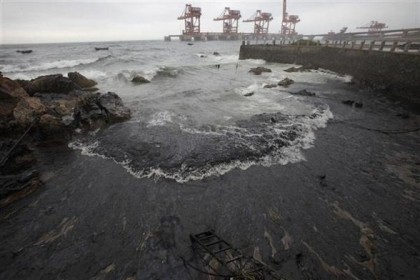
China is a major trading partner of New Zealand but some critics believe media ‘marginalised’ coverage of last month’s Dalian oil spillage crisis. Rose Rees-Owen reports.
Rob Lee is a site engineer and a concerned citizen about the state of the media. New Zealand’s mainstream media coverage of an oil spill disaster in Dalian, China, last month has got him riled.
“BP, big company big publicity; major event in the back blocks of China no publicity. Ability to report the facts, zero,” Lee says. “This makes me so angry.”
Lee is deeply concerned with journalism ethics. He believes television, newspaper and radio fight for ratings to attract advertisers and make money.
He also claims that the coverage of the oil spill in China has breached journalism ethics, and that stories should be chosen on their severity merits and not because they rate well.
The EPMU (Engineering, Print and Media Union) journalism code of ethics first principle states: “[Journalists] shall report and interpret the news with scrupulous honesty, by striving to disclose all essential facts and by not suppressing relevant, available facts or distorting by wrong or improper emphasis.”
Looking at TVNZ, 3News and the New Zealand Herald, the coverage of the China oil spill is a blip on the radar compared to the coverage of the BP oil spill in the Gulf of Mexico.
The disaster in Dalian, Liaoning province, happened on July 16 – and the first and only story to appear on TVNZ was not broadcast until two weeks later on July 31.
3News fared slightly better with three stories – July 21, 22 and 30.
Small mention
The Herald, however, only had a small mention of the China oil spill in an article titled “Killer floods” and one photo in the online edition’s “Day in photo” section which does not appear in the printed version of the newspaper.
Compare this to the BP oil spill coverage, TVNZ’s website returns 283 search results involving the BP oil spill, with the latest story published on the August, 10. 3News has 128 stories, and the Herald has 208.
The stories cover extensive issues such as environment, cost and methods in attempting to stop the leak, lawsuits, and implications for BP.
Media commentators offer as one reason for this huge imbalance in coverage is that China is a communist country and does not have a free press. The information flow from China is heavily restricted.
Also New Zealanders can relate to the Gulf because it is represented in pop culture every day.
Jeremy Rose from Mediawatch quotes Radio NZ International news editor Walter Zweifel on the “racial coefficient” of NZ reporting: “One Kiwi life equals four Australian lives, 10 US lives, 100 Samoan lives and 1000 Chinese or African lives.”
This would mean for a Chinese issue to get as much coverage as Timothy O’Donnell – the New Zealand soldier who was killed recently in Afghanistan – has attracted, at least 1000 Chinese would have to die.
No excuse
Rob Lee believes journalists have not been diligent enough in their coverage of the China oil spill, and believes that the news value of cultural proximity is no excuse.
Another factor that hindered the coverage of the China oil spill compared to the coverage of the BP oil spill is the size of the spill itself.
From the limited coverage, 3News has these statistics: “China Central Television earlier reported an estimate of 400,000 gallons (1,500,000 litres) – as compared with 94 million to 184 million in the BP oil spill off the US coast.”
The statistics suggest that the spill in China is minor compared to the spill in the Gulf, and because the BP oil spill is so much more server it justifies the coverage that it has received compared to the oil spill in China.
However, the information comes from China Central Television, a state-owned channel, and because the oil spill is an embarrassment to government, it is in the government’s best interest to report a small spill.
Lee says: “94 to 184 million gallons was the final amount BP accurately measured. The initial estimates presented to the media were far lower than this.”
The Deepwater Horizon explosion which caused the BP oil spill disaster, which happened on April 22 (with the first report on TVNZ on April 29), states:
Spewing oil well
“The spill is not nearly as big as the Exxon Valdez disaster, which spilled about 50 million litres of oil into the Prince William Sound in Alaska in 1989.
“BP’s well is spewing about 190,900 litres of oil a day into the ocean, the Coast Guard estimates.”
Lee criticises the media coverage neglect: “Why should the media target a small proportion of individuals who want the facts and well rounded journalism, where a NZ life is worth as much as a Chinese life? Ethics, perhaps?”
Rose Rees-Owen is a Postgraduate Diploma in Communication Studies student on the Asia-Pacific Journalism course at AUT University.


